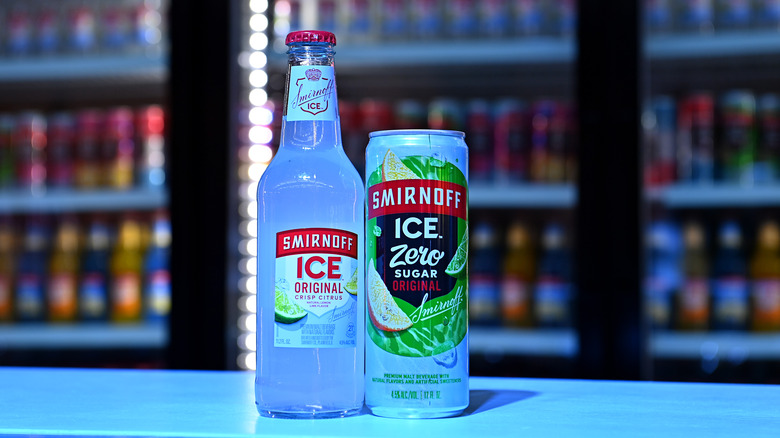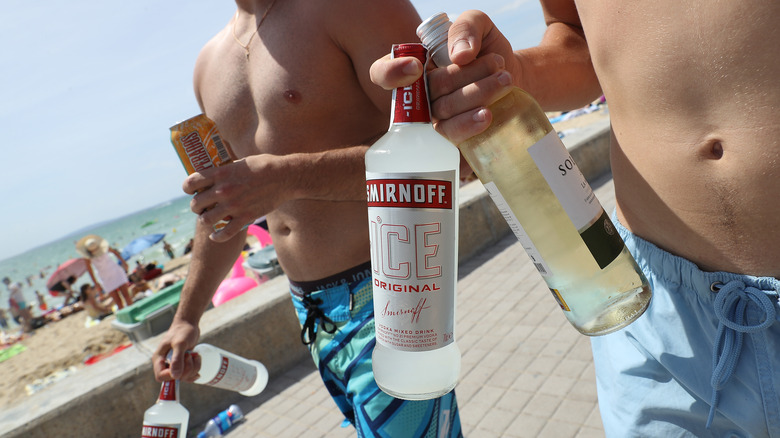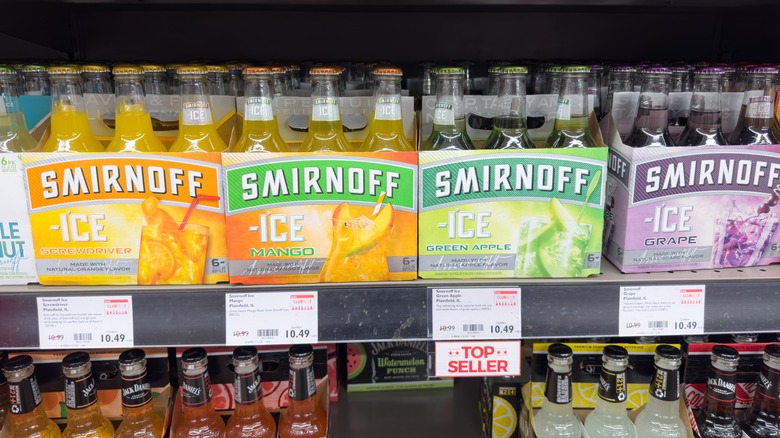What Does It Mean To Get Smirnoff 'Iced' And How Did It Start?
If you recognize the cold, cloudy beverage, it may be because you yourself have been Smirnoff "iced" in the past. The prank-style drinking game can trace its origins back to some creative kids at the College of Charleston in South Carolina. American college drinking culture is infamous for rowdy parties and boozy customs, like some notorious college football tailgating traditions. "Icing" is one of these games that began at one school, but eventually expanded to campuses around the country. It was first known as "Bros Icing Bros" as it was apparently Pi Kappa Alpha fraternity brothers that kicked off the craze. There are only two original rules when it comes to "icing," both of which were emailed to, and published by the outlet BroBible back in 2010.
The first rule is that an Ice cannot be refused. The bottle is placed somewhere surprising or unlikely, meant to be stumbled upon or discovered by the unsuspecting victim. Once it's spotted, it must be chugged, preferably while kneeling. But if the target of the Ice has another Ice on hand they can play it, à la an Uno Reverse card, making the initial "icer" chug both bottles. Original rules state that if an Ice is refused, the refuser is excluded from the "icing" game forever. Since the prank has outgrown the college campuses where it germinated, the rules are a bit more lax and varied now, but the core principal remains the same: find an Ice, take a knee, and drink.
From misogyny to marketing
Starting in the 1990's, alcohol companies capitalized on the fact that certain mixed drinks were taxed at the same rate as beer, unlike wine-based drinks which incurred a steeper tax. Beverages like Mike's Hard Lemonade, Smirnoff Ice, and some ready-to-drink cocktails use alcohol fermented from malt, the same kind of booze that puts the "twist" in Twisted Tea.
There are a number of these kinds of adult beverages on the market today, so why was Smirnoff Ice the choice prank device of the fraternity brothers who invented this game? Unfortunately, the answer likely includes a degree of sexism. Smirnoff Ice was initially considered a more feminine drink due to its definitive sweetness, adding an extra layer of intended humiliation for the "bro" being "iced."
Some college drinking games have been around for decades, like the legendary Beer Pong (try the fancier version with a sparkling swap), but "icing" quickly rose through the ranks of drinking games. This was partly because it could be played anywhere and required virtually no setup or cleanup. But the growing influence of the internet had a hand in its fame as well. When the game first took off a website called BrosIcingBros.com was created. It served as a hub for photos and videos of people being "iced," and sometimes received as many as 100 submissions per day. This curated content helped to proliferate the prank-style party game in true 21st century fashion; by harnessing the power of social media virality.
No support from Smirnoff
Today, more than two decades since it was released, Smirnoff Ice is available in many grocery and liquor stores and comes in a variety of fruity flavors aside from the lemon-lime original. As the game exploded in popularity across college campuses, more and more people were buying Smirnoff Ice not only to prank their friends, but as a defense against getting iced themselves. And while Smirnoff likely owes a good bit of their malt-beverage market presence to the spread of the "icing" game, the company was eager to distance itself from the trend, going as far as to have BrosIcingBros.com shut down.
In June of 2010, the parent company of Smirnoff, Diageo, released a statement that made it clear they had no intentional involvement with the popular game. There had been suspicion prior to the statement that the whole thing might have been a kind of viral marketing campaign, but the company made it clear it was not in line with their marketing principals. It's not hard to understand why Smirnoff and its parent company were not eager to be associated with potential overconsumption or underage drinking culture. Despite its somewhat problematic roots, however, and the shuttering of "Bros Icing Bros," the game has remained in the millennial zeitgeist. It has outgrown its fraternity origins and developed into something more inclusive that can still be played by almost anyone, anywhere.



